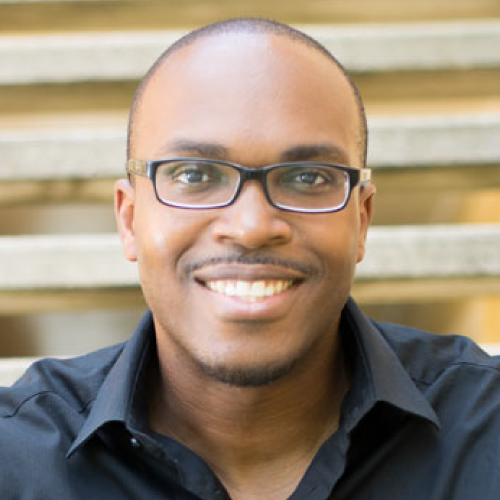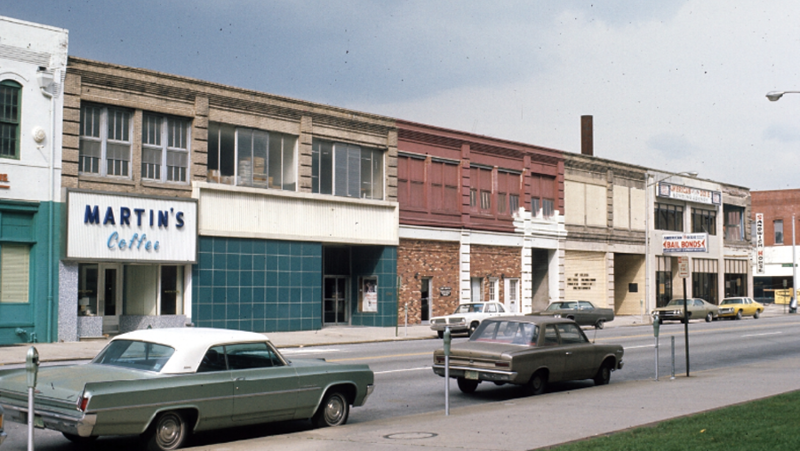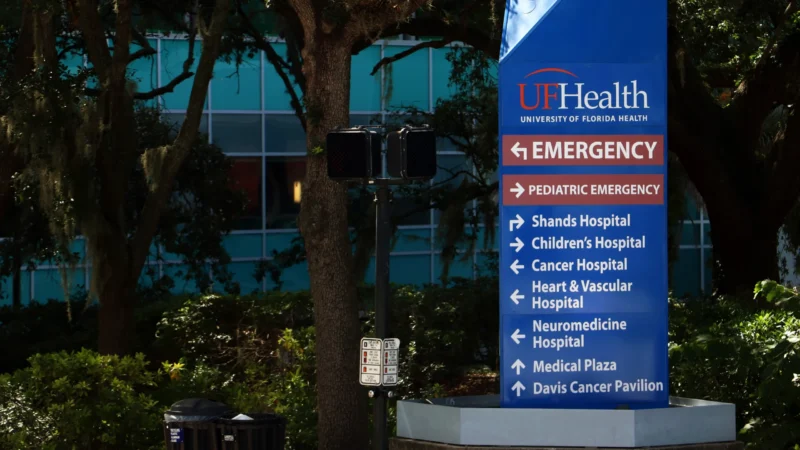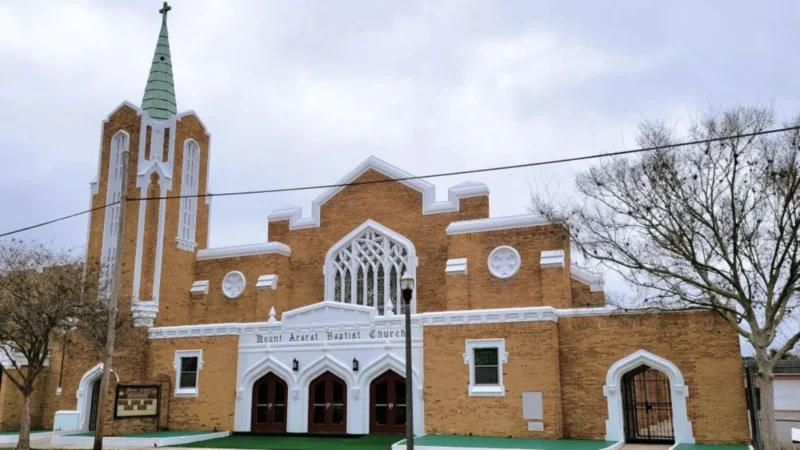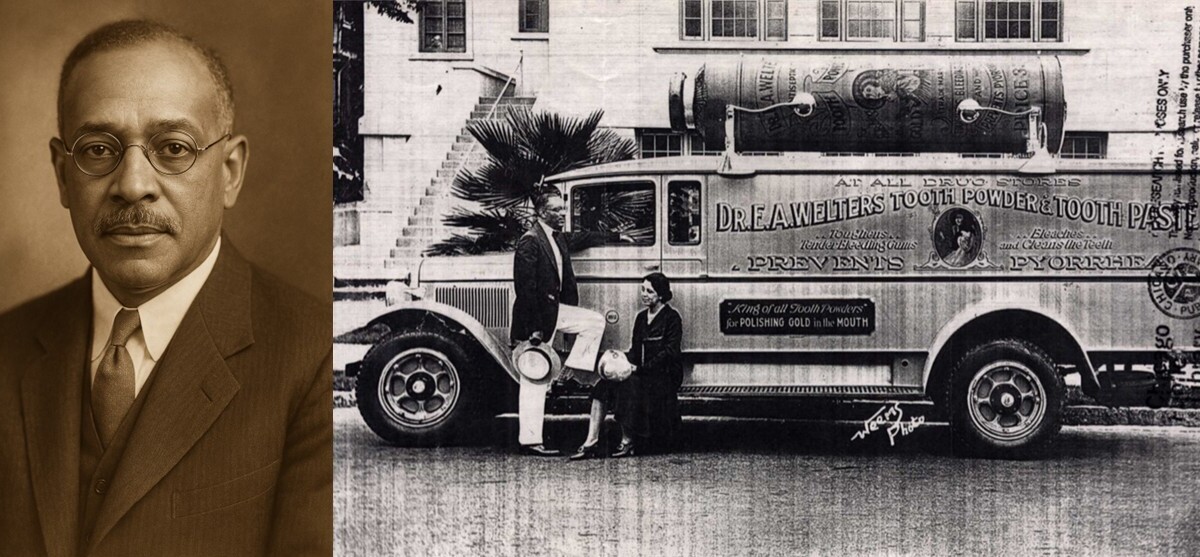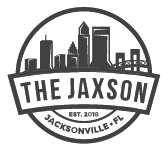
The rich aroma of roasting coffee has long been woven into the fabric of Jacksonville’s identity. While many associate that familiar scent with Maxwell House, it was neither the first nor the only company to fill the city’s air with the fragrance of fresh-roasted beans in the early 20th century.
In fact, Jacksonville was once home to a vibrant coffee roasting industry, with several pioneering businesses contributing to its legacy. What follows is a look into the fascinating history of the city’s early coffee roasting plants and the people who helped shape this enduring tradition.
Eight O’Clock Coffee
1741 W. Beaver St.

George Gilman founded the Great Atlantic & Pacific Tea Co. in New York City in 1859. Originally established as Gilman & Co., it was renamed A&P in 1869. By 1930, A&P had grown into the world’s largest retailer, generating $2.9 billion in sales across 16,000 store locations. Until 1965, A&P maintained its position as the largest retailer in the U.S., achieving a level of cultural prominence comparable to that of Walmart, McDonald’s, or Google today.
A&P’s Southeast headquarters was located in Jacksonville, where its regional operations included an industrial bakery and the Eight O’Clock Coffee roasting plant. The coffee roasting facility opened near the West Beaver Street viaduct in 1925, followed by the addition of an industrial bakery in 1932.
A&P’s decline began in the post–World War II era, as it struggled to adapt to the changing retail landscape and lost ground to modern competitors. In 1968, A&P relocated most of its Jacksonville operations—except for the coffee plant—to new facilities, including a warehouse on the city’s Northside, now occupied by Sysco International Food Group. During the 1980s, Beaver Street Fisheries acquired much of the former A&P complex on West Beaver Street.
The Jacksonville Eight O’Clock Coffee plant ceased operations in 1990. Although A&P experienced a brief revival in the early 2000s, it ultimately filed for Chapter 11 bankruptcy in both 2010 and 2015, ceasing operations for good in 2015. Today, Eight O’Clock Coffee is produced by the Eight O’Clock Coffee Co., a subsidiary of Tata Consumer Products, with its sole remaining roasting facility located in Landover, Maryland.
Bingham Coffee Co.
312 Park St. / 5970 Philips Highway

Polychronis Hanjakos, born in Greece in 1877, immigrated to New York City in 1919. In 1923, together with Michael Carvelis, he founded the Arabian & Turkish Coffee Co. at the Ocean Street Market in Downtown Jacksonville.
The following year, in 1924, family members Peter Hanjakos and William Carantzas opened the Colonial Coffee & Tea Co. at 715 Main St. Carantzas, also a native of Greece, was also the proprietor of the Manhattan Hotel, located at 1015 W. Bay St., on LaVilla’s Railroad Row.
After the Arabian & Turkish Coffee Co. closed, Polychronis Hanjakos joined Peter at the Colonial Coffee & Tea Co. In 1930, he sold his interest in the business to local businessman Thomas V. Porter and established the National Coffee Co. at 853 Kings Road in LaVilla. The company continued operations until the death of Paul Christ Hanjakos in 1943.
In 1931, James William Bingham joined the National Coffee Co. as a salesman. Born in Kentucky in 1887, Bingham had relocated to Jacksonville after World War I and spent much of the 1920s running a Downtown restaurant.
Two years later, in 1933, Bingham founded his own roasting business, the Bingham Coffee Co., located at 312 Park St. in the Brooklyn neighborhood. Around the same time, a 19-year-old newcomer named Frederic Robert Martin joined the company as a coffee salesman. Over time, Martin became a part owner of the business.
In 1957, the Bingham Coffee Co. was sold. Bingham retired and moved to Miami Beach, while Martin acquired the Bartley Coffee Co. and established the Martin Coffee Co.
Bartley Coffee Co.
327 E. Bay St.

The Bartley Coffee Co. was established in 1936 by Francis A. Bartley, who had previously served as vice president and general manager of the W.S. Quinby Co.’s coffee roasting operation, located in the Union Terminal Warehouse on Jacksonville’s Eastside.
Bartley’s own coffee roasting plant was situated at 327 E. Bay St. in the heart of Downtown Jacksonville’s bustling working waterfront district.
After more than two decades of operation, the Bartley Coffee Co. was acquired in 1957 by Fred and Amy Martin, who rebranded the business as the Martin Coffee Co.
Condaxis Coffee & Tea, Inc.
1805 W. Beaver St.

Peter “Tykie” Condaxis founded Condaxis Coffee in 1959. Born in Manhattan to Asia Minor refugees of Greek descent, Peter grew up in a family rooted in hospitality. His parents operated the Coffee Pot restaurant on Eighth Avenue during the 1930s.
In 1950, Condaxis was stationed at Cecil Field while serving in the U.S. Navy. Following his service, he remained in Jacksonville and, in 1954, joined the quality control department at the Maxwell House coffee roasting plant Downtown.
After five years of industry experience, Condaxis took a bold step and launched his own wholesale coffee roasting business with a $500 investment.
Two decades ago, Condaxis Coffee began bucking industry trends by sourcing most of its beans directly from growers in Brazil, Colombia, Costa Rica and Nicaragua. At the time, very little coffee came through the JAXPORT; instead, it was primarily trucked in from hubs like New York, Miami and New Orleans.
Today, Condaxis Coffee & Tea stands as the second-largest coffee roaster in Jacksonville and is recognized as a legacy business in the city’s Rail Yard District. Its diverse client roster includes Metro Diner, Bagel 13, Village Bread Cafe, Beach Diner, Marker 32, North Beach Fish Camp, Planet Fitness, Safe Harbor, Grumpy’s Restaurant, Alhambra Theatre & Dining, Soul Food Bistro, Cross Creek Steakhouse and Taverna.
Martin Coffee Co.
1633 Marshall St.

The Martin Coffee Co. is one of Jacksonville’s oldest continuously operating coffee roasters. It was founded in 1957 by Fred and Amy Martin, following their purchase of the Bartley Coffee Co., which was then located at 327 E. Bay St.
At the time, East Bay Street was a bustling industrial waterfront district. The company’s specialty coffees were roasted in a two-story facility and distributed to a growing clientele of restaurants and hotels across the region.
By the 1980s, however, operating a roasting plant in that location had become increasingly challenging. The space was cramped, and the logistics of shipping and receiving goods by truck required moving items manually from the street through the back of the building. In response to these constraints, the company relocated in 1987 to a larger and more efficient facility at 1633 Marshall St., near Talleyrand Avenue.
Today, Martin Coffee Co. serves many of the region’s finest restaurants and hotels. It has grown into one of the largest and oldest independent coffee roasters in the Southeastern U.S.
Maxwell House Coffee
735 E. Bay St.

Shortly after the Great Fire of 1901, Norman Merry established one of Jacksonville’s earliest coffee roasting operations. His company, Merry & Co., operated a coffee roasting plant in LaVilla from 1902 to 1912.
Two years before Merry’s business closed, the Cheek-Neal Coffee Co. opened a new roasting facility on East Bay Street, marking a significant expansion of Jacksonville’s coffee industry.
Founded in Nashville in 1892 by Joel Owsley Cheek, Cheek-Neal was drawn to Jacksonville for its strategic location and barge-accessible waterfront. In 1910, the company opened its East Bay Street plant specifically for its capacity to receive large shipments of coffee beans by barge. The facility initially employed 30 workers and produced approximately 40,000 pounds of coffee per day.
In 1928, Cheek-Neal was acquired by the Postum Co., which rebranded as General Foods in 1929. Shortly afterward, the company adopted the name of its most successful product—Maxwell House—named after the famed Maxwell House Hotel in Nashville, Tennessee, where the blend was first served.
The Jacksonville Maxwell House plant’s iconic neon sign, erected in 1955, has remained a cherished local landmark ever since.
Over the years, the facility has expanded to cover nearly 10 acres and 400,000 square feet of manufacturing space. Today, it stands as a major Downtown fixture and holds the distinction of being the last remaining Maxwell House coffee roasting plant in the U.S.
From this historic site, the plant continues to roast and ship a variety of well-known brands nationwide, including Maxwell House, Gevalia, McCafé, Maxwell House International Coffee and Yuban.
Old South Coffee Co., Inc.
2379 W. Beaver St.

Wayne M. Hodgdon was born in Clinton, Maine, in 1890 and raised in Middlesex, Massachusetts. By 1918, he had relocated to Greenfield, Massachusetts, where he worked as a coffee salesman for the W.S. Quinby Co., a major coffee roasting business established in Boston during the late 1880s.
In 1929, W.S. Quinby expanded to Jacksonville, opening a coffee roasting plant in the Union Terminal Co. Warehouse on the Eastside. Hodgdon moved to Jacksonville that year to support the company’s new Southern operations.
Following the eventual closure of W.S. Quinby, Hodgdon launched his own enterprise—the Old South Coffee Co. The company’s first roasting plant was located at 624 W. Bay St. in LaVilla, just west of Broad Street in an area known as Railroad Row, characterized by its concentration of wholesale businesses, hotels, and restaurants.
During World War II, the Old South Coffee Co. moved its operations to a new facility at 2379 W. Beaver St. The business remained at this location until it ceased operations in 1951.
Wayne M. Hodgdon passed away in Jacksonville on Valentine’s Day, 1972. His former coffee roasting facility on West Beaver Street was demolished in 2008.
W.S. Quinby Co., Inc.
700 E. Union St.

Winfield S. Quinby founded the W.S. Quinby Co. in Boston in the late 1880s. Born in 1862 in Vermont, Quinby became a pioneering figure in the coffee roasting industry.
He was known for his emphasis on craftsmanship and knowledge in coffee preparation.
He once stated, “The fundamental necessary to making good coffee is to know the physical nature of coffee, and the action of coffee properties in contact with hot water. So you should not have coffee made by an employee who is ignorant of the properties of the coffee bean.”
Under his leadership, the company flourished, eventually expanding to include roasting plants in Chicago, Philadelphia, New York City and Jacksonville by 1930. W.S. Quinby roasted and wholesaled both coffee and tea, and its most recognized product was its flagship La Touraine Coffee brand.
Following Quinby’s death in 1928, the company continued operations for several years. Its Jacksonville roasting facility was located in the Union Terminal Warehouse Co. building at 700 E. Union St. By 1930, Sidney Lanier served as vice president, while Francis A. Bartley was employed as the Jacksonville plant’s last general manager.
After the Jacksonville plant closed in 1935, Bartley went on to found his own coffee roasting business—the Bartley Coffee Co. In 1957, the company was acquired by Fred and Amy Martin and rebranded as the Martin Coffee Co., which remains in operation in Jacksonville to this day.
